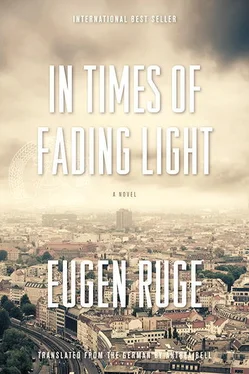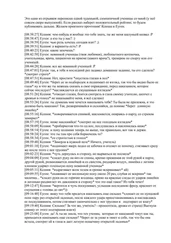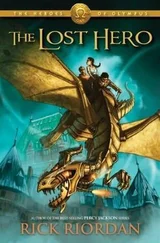And so, or perhaps also because hunger is making him edgy, Alexander will decide to cut the ritual short and press the money into the woman’s hand, and then will not do it after all, but will wait until, with elaborate care, she chooses a tub of fruit—out of three in all—places three tortillas—out of six in all—on a paper plate, and calculates her invisible figures with a blank gaze; he will watch her hands, dark but with palms rosy as a child’s, her thin, stern face, surrounded by a smoke-blue scarf, and will wonder how old this woman is: fifty? Thirty? What is the expectation of life in Mexico? Or rather: what is the expectation of life of a woman from the Mexican lower classes?
Although he is beginning to shake slightly because his blood sugar level is low, he will wait until the woman has walked away, her steps slowed down by the sand. Then he will rinse the fruit again thoroughly with drinking water.
He will eat all the fruit at once. He will be trembling with greed as he eats it, and when he looks at his fingers, sticky from the sweet fruit and raised as if to take an oath, he will be unable to avoid thinking of Kurt, wandering around a dilapidated house somewhere at the other end of the earth. He will wonder whether, in some vague, indistinct way, Kurt misses him, Alexander. Then, when he has eaten his tortillas too, and cleaned his fingers with a little sand and water, he will open the old folding chess board, in which he also keeps the papers that he took from Kurt’s folder labeled PERSONAL.
He rediscovered the papers the first time he played chess with the biker. At first he thought they were all letters from Kurt to Irina, but in reality they are an assortment of different written documents. There are indeed letters, selected letters to Irina, but also some from her, as well as Kurt’s letters to him, Alexander, of which Kurt—typical of him—kept carbon copies. Others are notes made by Kurt, always in the same spindly hand, on the backs of old bank statements or rejected manuscript pages. Notes for what? And what about?
At first Alexander read them impatiently, unsystematically. Although neat at first sight, Kurt’s handwriting is not easy to decipher. The pages, scribbled over and over, put Alexander off. There was the odor of duty about it. The odor of Kurt. It was as if that handwriting brought back all the demanding, overpowering dominance that Kurt had once meant to him.
Much of it remains incomprehensible, even when he has succeeded in deciphering the letters: Kurt writes about “the execution of Rohde.” About a Central Committee man who reminded Kurt of (illegible). About a blue Trabi in the woods with its windows steamed up with condensation.
Now and then there were notes in Russian, and furthermore so cryptic, sprinkled with abbreviations, that it took Alexander a long time to discover what they meant at all—they were records of erotic experiences. Why did Kurt record them? And why in Russian?
Perfectly legible: a complaint about Charlotte, who was writing an article about the economic development of Mexico at the time:
No idea of anything. Phones seven times a day. Wants to know how many zeros in a million.
Sometimes there is curious stuff to be read on the backs of these notes: a complaint from Kurt about a gas bill a hundred times too high, or a letter about the collective authors’ fee for his contribution to a work by several hands, published in Japan, for which Kurt is owed forty-four marks, half that sum to be paid in foreign currency if Kurt has a bank account that can deal with it, otherwise in Forum checks: Please reply by return! The letter is signed by the director of the institute and a deputy.
There are also notes in which Alexander is mentioned, and here Kurt’s memories diverge astonishingly widely from what he himself recollects: he does not remember having voluntarily worn his military uniform for a sick visit to Wilhelm in hospital, he is surprised to find Kurt describing blond Christina as intelligent, but toes the Party line a little too much one hundred percent; he wonders where he was when his mother burst into tears at the sight of her son in uniform, because, so Kurt says, it reminded her how a superior officer had once ordered her to give a wounded German soldier the coup de grâce, which she refused to do, although refusing to obey orders could mean the death penalty. In brackets: include in personal description.
What was all this? Notes for a novel? For a second part of his memoirs, taking place in the GDR?
On that day—the day of Mazunte—Alexander will come upon a note from February 1979. Of course he remembers that winter. However, he will not guess that Kurt was writing about him, Alexander, until he has succeeded in deciphering these words:
Is obviously out of his mind.
And a little farther down:
Informs me that my whole life is a lie.
And a little farther down again (and even more surprising):
Melitta says he has taken to going to church.
A picture will emerge: Schönhauser Allee. Dirty snow at the roadside. His father walking beside him—but where to? Where are they going?
A fairly clear image: Kurt suddenly stops and shouts, and it will seem to Alexander as if he could hear—which is totally absurd— what Kurt is shouting:
People are starving in Africa!
Then there is a list of all the sums of money received by him, Alexander, in December 1978—including Christmas presents (two thousand two hundred marks in all); then come laments bewailing all that Irina is suffering on account of him, Alexander; and a sentence that is difficult to decipher, about the life that Kurt, if Alexander has read it correctly, is not going to let anyone foul up.
That afternoon, as the hottest time of day approaches, Alexander will put the loose sheets of paper back inside the chess board and climb up to the guesthouse. The biker, on seeing him coming with the chess board under his arm, will suggest a game, and Alexander will agree, although afternoon drowsiness is already beginning to weigh his eyelids down.
As usual when they play chess and do not want to be disturbed, they will sit on the bench behind the Frida Kahlo guestrooms, where at other times Alexander reads the newspaper dated 12 September, turning sideways to each other and with the chess board between them at a slight incline, like the seat of the bench.
Alexander’s opening gambit will be f2–f3, an aggressive and rather reckless variant that he often played against Kurt—with success, at first. The biker, impassive, will counter it with d7–d5, and Alexander, for one reason to avoid exposing his queen on h4 later, will move his knight, carved from Siberian cedar by a camp inmate over half a century ago and missing its nose ever since Alexander can remember, to f3.
The chickens kept by the Mexican staff will peck about in the unproductive sand beyond the wire netting fence.
Alexander’s thoughts, as he automatically moves 2…. c5, 3. e3 e6, 4. b3 K6, 5. Bb2 Kf6 and 6. Bd3 will go back again to that distant winter’s day: to the icy sidewalks on Schönhauser Allee, to the curious, aimless walk they took, to the quarrel about Africa… but suddenly the film will go on: Alexanderplatz, a cold wind. The old self-service restaurant, no longer extant, to the left by the clock showing world time—is that possible?
The biker, whose name is Xaver, will bend low over the board when they have both made their castling moves, so that his head covers half the playing surface, and so as not to have to look at his reddened skin, which appears where the light falls on it, Alexander will turn his eyes on the distance, and while the biker begins thoughtfully nodding his head over the present positions will suddenly remember more details: the laminate-topped tables, modern at the time but already shabby, where you stood to eat; the metal counters; the smell of—was it goulash? He will see Kurt in his lambskin coat and fur cap standing at one of those tables, spooning in his goulash; he will see himself from the outside: head shaven, in his shabby parka, and—incredible, he still remembers this!—the blue pullover, darned several times in a color that didn’t quite match it, that he thought it necessary to wear at the time because he felt an inexplicable need to appear repellent.
Читать дальше












